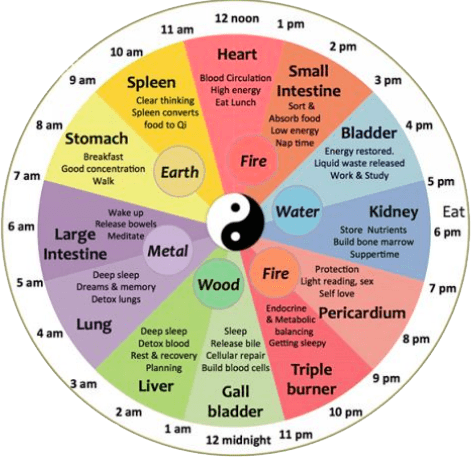Organ clock basics
The “organ-clock” has long been part of traditional Chinese medicine. The basis of this theory is that human organs function and rest in a specific chronological order. Thus, according to the periodically alternating biorhythm, everything has its time, so does nutrition, training, and rest. The point is that we have twelve main organs that alternate at work at two-hour intervals, at which point the organ that is currently working is reserving almost all of our energy.

1 am to 3 am:
The performance of the organization is then the lowest. During this period, the liver works, i.e. it carries out the detoxification, so in this case it should not be further burdened (the alcohol consumed in this case is more difficult to decompose, so just be careful with partying). In addition, body temperature is the lowest.
3 am to 5 am
This is the most active time of the lungs, as it prepares for the whole day’s load. The sexual activity of men is also the most intense, because most sex hormones are also produced. Adrenal corticosteroid production is also at its peak, so you want to adjust to normal hormonal fluctuations and need to take steroids, then take your pills because it has the fewest side effects.
5 am to 7 am:
It is around this time that the colon works most actively, so this is also a healthy time to defecate. This is because it frees our body from toxins, which are thus unable to be reabsorbed and reduce our performance. Hypoglycaemic tablets and beta-blocking antihypertensives can then have their maximum effect. In contrast, the body tolerates the least pleasurable substances and harmful substances in this case: morning coffee and cigarettes.
7 am to 9 am:
At this time, the stomach is most burdened. In this case, it is worth eating a rich, vitamin- and mineral-rich breakfast, because then the stomach can work most efficiently.
9 am to 11 am:
This is when our body temperature is optimal and the nervous system is the calmest in this period, so this is when our performance peaks. This is the easiest time to learn, but it’s worth repeating in the afternoon for the sake of lasting fixation.
11 am to 1 pm:
This is when the heart cycle peaks, so this is the ideal time to workout. Around noon, the production of stomach acid and then bile intensifies, so we are ready for lunch. Mental performance falls because the body focuses on digestion. Bile diuretics then have the most active effect.
1 pm to 3 pm:
During this period, blood circulation slows down. All energy is concentrated in the small intestine. As blood circulation in the limbs and skin decreases, pain perception also decreases.
3 pm to 5 pm:
In the afternoon, the bladder works most intensely, so in this case, consume plenty of sugar and, of course, alcohol-free fluid. Because our body flushes out toxins during the selection process, we are in good shape again, so we can train, learn, and work at full intensity. Sports that require endurance can be practiced much more effectively in this case, and training is now the most effective, and this is when the immune system can be trained most actively. The effect of antacids is best in this case.
5 pm to 7 pm:
During this period, our kidneys work with the greatest intensity, so DO NOT disturb the cleansing work of our body with anything, especially NE with fatty, sugary, salty foods and drinks. In this case, the blood pressure also drops.
7 pm to 9 pm:
In this part of the daily cycle, the body is already preparing for the night rest, most of the functions of the organs gradually slow down. Most of the dinner eaten at this time is no longer digested, but stored until morning.
9 pm to 11 pm:
The most relaxing time during these night hours is Sleep, so do NOT engage in any physical or mental activity. Thus, on the part of the autonomic nervous system, parasympathetic (dictating calm, incorporation) functions take absolute predominance.
11 pm to 1 am:
In this case, the ability of the gallbladder to spasm is most intense. And the substances that cause pain are much more intense in this case, so the pain intensifies and is less relieving.
Recommendations
In today’s world, unfortunately, it is not possible to fully follow our biological clock, but it doesn’t hurt to take it into account when designing meals and workouts. Here are some tips if we still can’t train at the best time possible:
Training before work:
In the morning the muscles and joints are still stiff, more time should be spent on warming up. Let your body wake up and gradually increase the intensity of your workout. Recommended sports in the morning: running, yoga, pilates, tai chi.
Training during lunch break:
IGet rid of thoughts about work and choose a sport that turns off.
Immediately after lunch, DO NOT go to training, register the movement before lunch. Effective sports during the day: brisk walking outdoors, weight training, stretching, medium intensity cycling, spinning.
Training in the evening:
Under no circumstances should you start training with a full stomach. Schedule your workout at least two hours after your last meal. Choose from sports that require concentration to help you forget about your daily worries. Allow enough time for derivation and stretching after sports. Recommended forms of exercise in the evening: squash, aerobics, choreographed aerobics, running, tennis, swimming.




